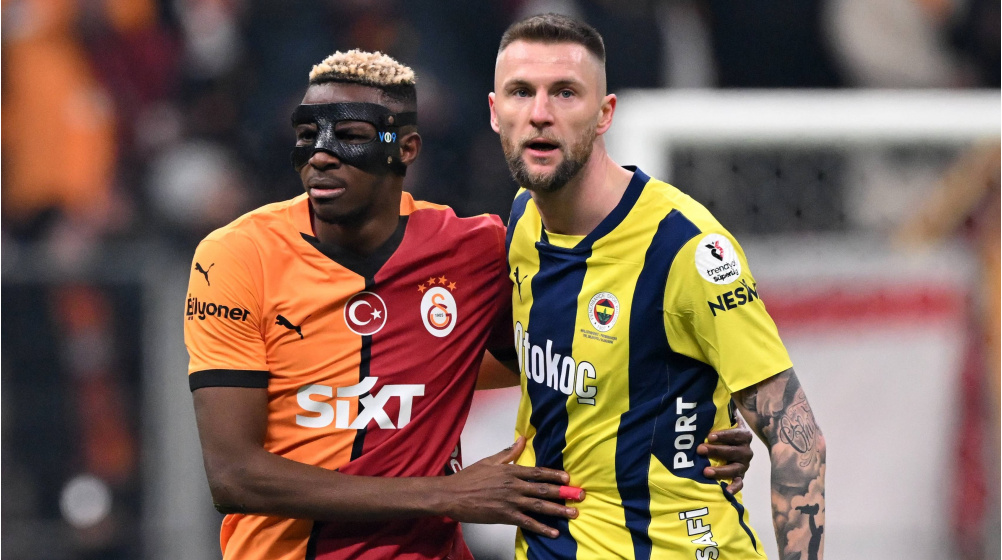Our Terms & Conditions | Our Privacy Policy
€1.14b in debt – Turkish football’s big four clubs have run themselves into serious financial peril
Trouble in the Süper Lig

©IMAGO
The financial management of Turkish football’s four major clubs—Beşiktaş, Fenerbahçe, Galatasaray and Trabzonspor—has become increasingly unsustainable in recent years. As of 2025, their combined debt has reached €1.14 billion, with loss-making transfers, exorbitant player wages, and limited transfer revenue standing out as the clearest indicators of the ongoing financial crisis.
According to data from Anadolu Agency, as of 28 February 2025, the total debt owed by the clubs to the Banks Association of Turkey stands at approximately €200.4 million. Beşiktaş owes €93 million, Fenerbahçe €76.6 million, and Galatasaray €30.8 million. Trabzonspor, meanwhile, has no debt included in this restructuring scheme. However, the majority of the debt burden lies outside of the Banks Association. Galatasaray’s non-bank debt stands at €293.9 million, Fenerbahçe’s at €255.5 million, Beşiktaş’s at €209.3 million, and Trabzonspor’s at €184.6 million. This brings the total debt of the four clubs to more than €1.143 billion. One of the most significant expenses for these clubs comes from transfer fees. Over the past five seasons, Galatasaray has a net transfer spend of €66.35 million, Beşiktaş €74.94 million, Fenerbahçe €60.78 million, and Trabzonspor €59.19 million. Collectively, the clubs have made a loss exceeding €261 million. Despite heavy spending, particularly Galatasaray and Beşiktaş have failed to balance their books with corresponding income from the transfer market. While Fenerbahçe has achieved relatively balanced sales in the past two years, they remain in the red overall.
The picture becomes even more striking when looking at player salaries. Some players in the Turkish Süper Lig earn wages on par with top stars in Europe’s “big five” leagues. Talisca, for example, earns €5 million for just half a season, while Mauro Icardi, Ciro Immobile, Victor Osimhen and Rafa Silva are on net annual salaries of around €6 million. Players such as Fred, Milan Skriniar, Sofyan Amrabat, Edin Džeko and Dušan Tadić earn between €4 million and €5 million net annually. The clubs face considerable exchange rate risks and budget imbalances in trying to meet these salary commitments. Beşiktaş President Serdal Adalı highlighted the wage crisis during a meeting of the club’s council. He pointed to the damage done by past transfer policies and offered a striking example: “Immobile’s net annual salary is €6 million. With 40% tax, that’s an extra €2.5 million. Add €2 million as a signing-on fee, and the total reaches €10.5 million. At the same time, we’re still paying Aboubakar €4.6 million while sending him to Hatay. Then we spend €10 million on a new striker. We’re placing a €17 million burden on just the forward line.”
As clubs struggle to stay afloat financially, Fenerbahçe recently took a notable step. The club announced the sale of a 4.8% stake in Fenerbahçe Football Inc. to a foreign institutional investor at a price of ₺46.10 per share. The club stated that the sale was a strategic move aimed at paying off debt to the Banks Association and strengthening its financial structure. Following this transaction, Fenerbahçe’s stake in the football company fell to 62.27%. On the transfer income front, success has been limited. The highest-profile sales in recent years include Sacha Boey and Ferdi Kadıoğlu, each transferred for €30 million. Arda Güler’s €20 million move to Real Madrid and Kim Min-jae’s €19 million transfer to Napoli are also among the more notable deals. However, these figures are still insufficient to establish a sustainable model. Most Süper Lig clubs fail to export players to Europe on a regular basis, limiting the return on transfer investments.
The financial future of Turkish football is clearly at risk. Growing debts, loss-making transfer strategies, excessive wage burdens and limited income potential all point to an unsustainable future. The clubs now face not only sporting challenges, but also serious financial jeopardy.
[ad_1]
Images are for reference only.Images and contents gathered automatic from google or 3rd party sources.All rights on the images and contents are with their legal original owners.
[ad_2]



Comments are closed.